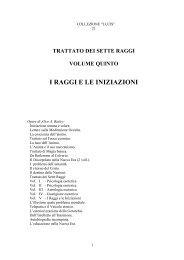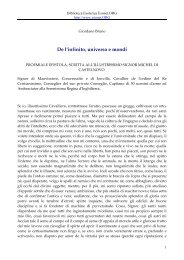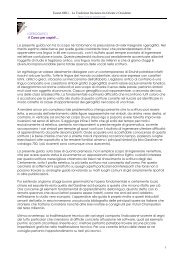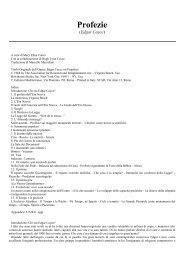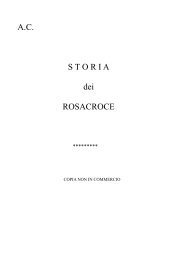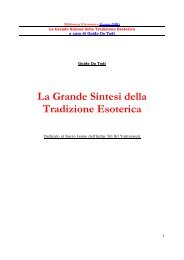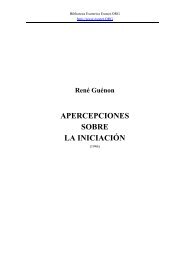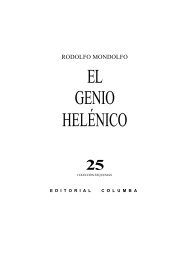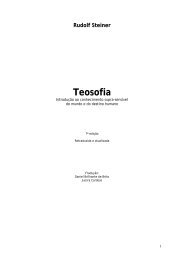Biblioteca Esoterica Esonet.ORG http://www.esonet.ORG 1
Biblioteca Esoterica Esonet.ORG http://www.esonet.ORG 1
Biblioteca Esoterica Esonet.ORG http://www.esonet.ORG 1
You also want an ePaper? Increase the reach of your titles
YUMPU automatically turns print PDFs into web optimized ePapers that Google loves.
<strong>Biblioteca</strong> <strong>Esoterica</strong> <strong>Esonet</strong>.<strong>ORG</strong><br />
<strong>http</strong>://<strong>www</strong>.<strong>esonet</strong>.<strong>ORG</strong><br />
Prelude to a New Interpretation of Reality - 3<br />
The individualistic approach: When a member of a primitive tribe fills an "office" — for<br />
instance, by participating in a ritual dance, wearing the mask of a vitalistic god, and<br />
feeling pervaded by the god's power — this experience does not permanently change the<br />
consciousness of the person, who afterwards assumes his or her usual life. But the<br />
possibility of wanting to retain the feeling of the experience and to build on it a "special"<br />
status is present in human nature. The person may seek to maintain his or her subjective<br />
identification with the power of the office, and this desire sets him or her apart from all<br />
other members of the tribe. Feelings of separateness and superiority develop, especially if<br />
the performance brought the performer into contact with a new or deeper level of power<br />
which produced unusual or spectacular results. The tribesman then may claim this power<br />
as characteristically and permanently "his own." He, as a "subject," possesses a unique<br />
power. He may claim this possession publicly, and the claim may be accepted by admiring<br />
members of the tribe. He is then "the one" person having such a power. But being still<br />
strongly conditioned by biological drives, he is likely to want to extend the scope of the<br />
power and to pass it to his progeny. Hereditary claim is laid, not only to the power itself,<br />
but to its possession as a social factor.<br />
More generally speaking, the feeling of being a unique individual, set apart from other<br />
persons (who are not so distinguished and do not possess the power) gives rise to the<br />
dualism of subject and object. The person as subject possesses objective, demonstrable<br />
powers; they are "his" and he can use them as he pleases. "This is my pleasure," says the<br />
chieftain, who rules "his" people and land. Soon the minds of philosophers or religious<br />
leaders feel the need to justify such a situation with the image of a personal God who<br />
possesses all imaginable powers and uses them as a "Play" (lila) to create the universe, His<br />
universe. Mind always works two ways: it interprets the results of activity, and these<br />
interpretations facilitate the spread of the activity by giving it the "sanction" of a coherent<br />
rationale. The mind performs this service by analyzing new situations to "discover"<br />
structural or essential factors ("laws"), then by deducing from these factors new ways of<br />
maximizing their power (technology).<br />
The moment a human being performs a new kind of action, feels elated by a new sense<br />
of power, and adds to the feeling of elation the thought, "This is mine, uniquely mine," the<br />
mental image of "I" arises — "I," a subject possessing a power to alter an objective world;<br />
"I," a subject owning objects that can be used, transformed, and destroyed. This<br />
realization is highly intoxicating. It is also the origin of the vast variety of conflicts<br />
inherent in most, if not all, of the systems of social organization human beings have<br />
devised, from the most capricious tyranny to the most benign democracy. It has led to the<br />
glorification of the subjective factor and devaluation of the objective world (nature). This<br />
in turn has inspired many systems of metaphysics and monotheistic religions, particularly<br />
in medieval India and Europe. These systems had to develop because they were needed to<br />
provide a foundation and justification for the slow and inherently stressful individualistic<br />
transition between the biologically dominated vitalistic type of consciousness and activity<br />
and the new (and mostly future) level of evolution which I call the Pleroma state.<br />
9



